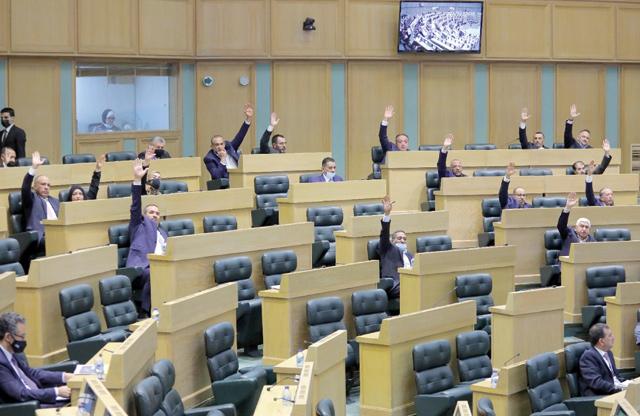You are here
Lower House pushes for better living conditions, lower taxes ahead of budget
By JT - Nov 21,2019 - Last updated at Nov 21,2019
AMMAN — The Lower House Financial Committee on Thursday said it will reject any provision in the 2020 state budget bill that stipulates hikes in electricity and water prices.
Kaled Bakkar, head of the committee, during a meeting with Finance Minister Mohamad Al-Ississ and Minister of Planning and International Cooperation Wissam Rabadi, unveiled the major points of the Lower House's demands for the 2020 State Budget and the budgets of independent public entities.
Bakkar said that this is the second meeting with the government ahead of sending the bill to the House, noting that according to the Constitution, the Lower House, after receiving the budget bill, is not allowed to add any financial item or increase the expenditures.
The committee is discussing with the government the reduction of living expenses and increasing of salaries, as well as cutting taxes, he said, noting that the Lower House had passed the income tax law provided that sales tax is gradually cut, but the government “has not abided” by that condition.
The committee expressed appreciation for the government's recent economic stimulus packages, noting, however, that these plans “do not meet its aspirations and ambitions”, calling for more stimulative measures and the activation of private-public sector partnerships to achieve the required growth, the Jordan News Agency, Petra, reported.
Al-Ississ said that the Lower House’s demands and suggestions are “clear”, stressing that the government is seeking to meet the committee’s ambitions and “will do everything possible” to address its proposals.
The 2020 State Budget bill, which will be sent to the Lower House, will consider the outcomes of previous budgets and the difficult conditions experienced over the past years as a result of the cutting off of Egyptian gas and the increase in population within a short time as a result of refugee influxes, along with border closures and the cost of maintaining the Kingdom's security in light of the surrounding wars.
He said that the bill “will not include” any items related to tax hikes, but will address tax and customs evasion, adding that the budget will increase financial allocations for social security networks, as well as improve the provided services.
Jordan has the authority to make its own decisions, he said, stressing that the Kingdom “will not accept” the imposition of any foreign financial decisions. He also reiterated that the reform programme is the country's “strategic choice”.
In terms of foreign assistance, Rabadi said that the Kingdom received $2.6 billion (some JD1.84 billion) in external aid during the first 10 months of 2019, with $707 million offered towards the National Response Plan to the Syria Crisis, and the rest as soft loans.
He added that the Kingdom expects to receive JD770 million before the end of the year, of which JD745 is a grant offered by the US as monetary support.
Related Articles
AMMAN — Finance Minister Mohamad Al-Ississ on Tuesday confirmed that the government will pay all overdue financial arrears to the private se
AMMAN — The Lower House on Monday referred the draft 2023 budget law to the Parliamentary Financial Committee.The Chamber referred the bill
AMMAN — The Lower House on Wednesday referred the 2021 municipalities and decentralisation draft law to a joint administrative and legal par
















